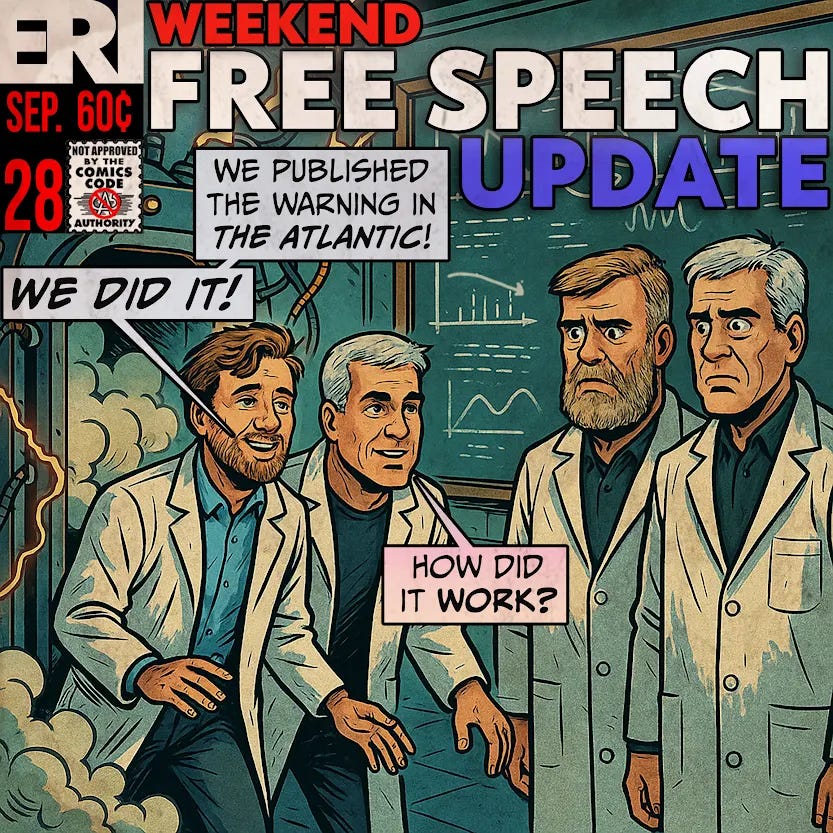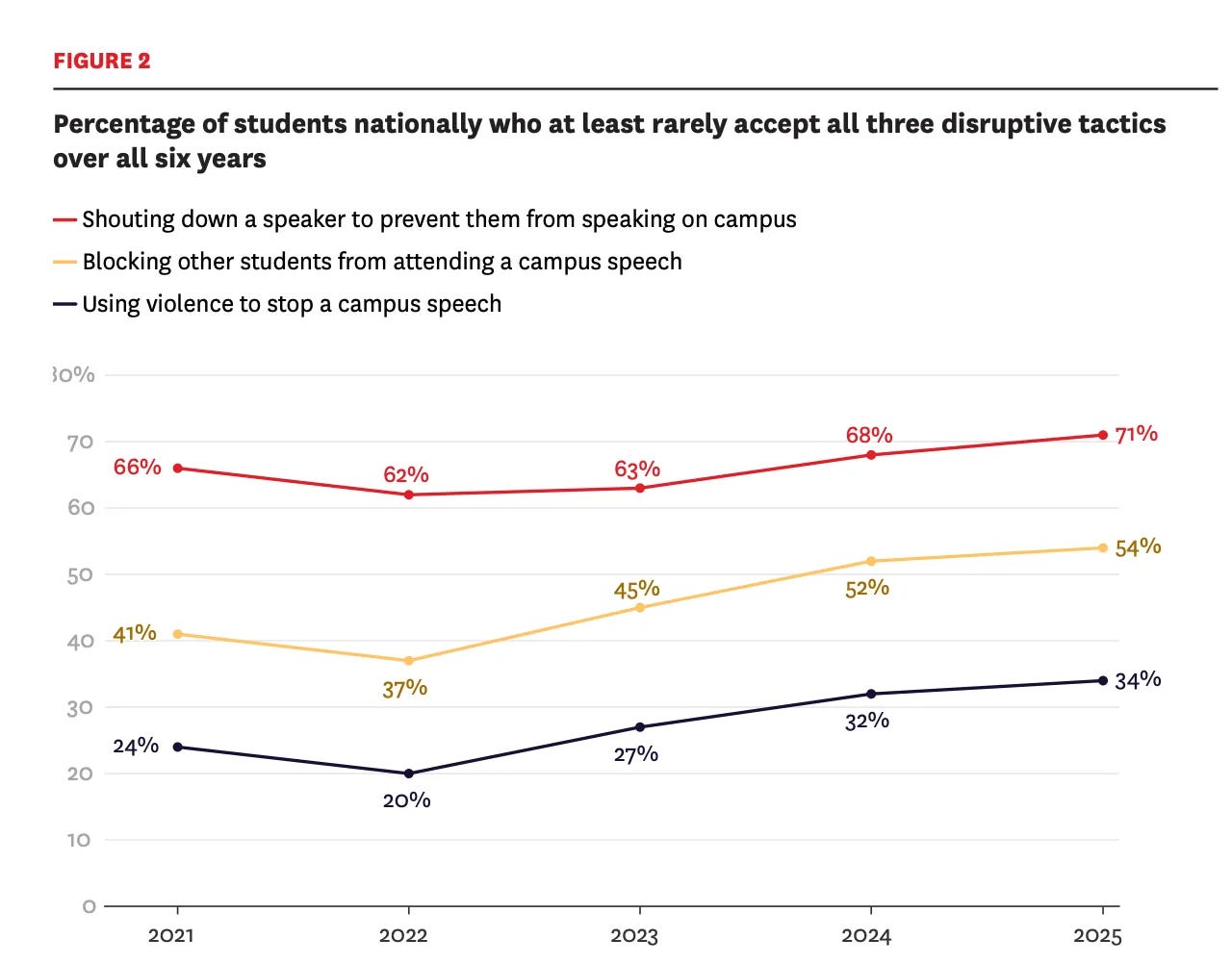My op-ed in the NYT, the ‘Coddling’ Atlantic article turns 10, me on C-SPAN, & more!
Bringing you the latest free speech news (9/28/25)
Story of the week
Everyone’s a Free-Speech Hypocrite (The New York Times) by me
I don’t like having to make a case for human rights such as freedom of speech by appealing to self-interest; these are supposed to be rights whose importance transcends one’s personal needs. But for political partisans, it’s often the only argument that cuts through. So here’s my practical warning: The weapon that you reach for today will be used against you tomorrow.
This week in ERI
This week in Expression
Carr’s threats to ABC are jawboning any way you slice it by Tyler Tone
Quebec is threatening to outlaw public prayer by Sarah McLaughlin
Government AI regulation could censor protected speech online by @Eden Kauer
This law, which covers both adults and minors, makes it illegal to publish an image of an identifiable minor that meets the definition of “intimate visual depiction,” which is defined as certain explicit nudity or sexual conduct, with intent to “arouse or gratify the sexual desire of any person” or “abuse, humiliate, harass, or degrade the minor.”
That may sound like a no-brainer, but deciding what content this text actually covers, including what counts as “arousing,” “humiliating,” or “degrading” is highly subjective. This law risks chilling protected digital expression, prompting social media platforms to censor harmless content like a family beach photo, sports team picture, or images of injuries or scars to avoid legal penalties or respond to bad-faith reports.
Efforts to silence scholars hit record high by Sean Stevens & Chapin Lenthall-Cleary
College students increasingly believe violence is justifiable to stop speech by Angel Eduardo
This week in FIRE’s blog
FIRE in the press!
Promote tolerance over termination at Iowa’s public universities (Des Moines Register) by Greg Harold Greubel
London Calling: Ronnie’s First Amendment Roundup
Tenured Public University Prof Gets TRO Against Insta-Firing Over His Sharp Social Media Posts About Charlie Kirk Shooting
In what may be the leading edge of lawsuits over terminations by public employers and/or at the behest of public officials for commentary on the Charlie Kirk assassination that drew strong condemnations, the federal court in South Dakota issued a temporary restraining order to tenured University of South Dakota professor Phillip Michael Hook, staving off for now the school’s stated intent to terminate him for an off-the-clock post on his personal Facebook account. The post expressed ambivalence over the killing, called Kirk a “hate spreading Nazi,” and wondered at the lack of similar concern over other high-profile violence—though Hook soon regretted the post and deleted it hours later. Nonetheless, after South Dakota’s governor and the state’s speaker of the house objected online to Hook’s post and called on USD to fire him, its Board of Regents voted to do so, placing him on administrative leave pending final termination. On Hook’s challenge to those moves as unconstitutionally retaliatory under the First Amendment, the court granted a TRO requiring USD to temporarily set aside the decision placing Hook on administrative leave and to reinstate him as a professor pending further litigation. The court held Hook spoke as a private citizen on a matter of public concern involving a public figure’s murder and questioning the respective reactions to that and other recent public murders and shootings, and that while his Facebook page identifies him as a USD professor, that did not make his post speech arising from his professional duties. The court also held that, under the Pickering balancing that therefore applied, USD did not show any disruption to on-campus activities, Hook’s teaching, or university operations to tilt in favor of it being constitutional to fire Hook, even if, in the days following his post, “hundreds of calls and message” came into the regents and/or university commenting negatively on it or calling for Hook’s removal. “And without more,” the court held, allowing USD’s actions to stand on “such vague and conclusory concerns ... runs the risk of constitutionalizing a heckler’s veto.” The court then concluded Hook suffered a material change in the terms or conditions of employment that would chill a person of ordinary firmness from continuing First Amendment-protected activity, such that the notice of intent to terminate and administrative leave were adverse employment actions for which Hook’s speech was the substantial or motivating factor. Next the court will decide whether to issue a preliminary injunction consistent with the TRO as the case continues, but the TRO decision confirms what FIRE has long said—the First Amendment protects faculty’s personal speech on matters of public concern.
International free speech stories of the week
Horror film digitally altered in China to make gay couple straight (The Guardian) by Amy Hawkins
An Australian horror film featuring a scene with a same-sex wedding was reportedly digitally altered for release in mainland China, transforming the gay couple into a heterosexual one, provoking outrage from viewers who spotted the change.
Nigeria Top Court Takes Up WhatsApp Blasphemy Case (Barron’s)
India court rejects X’s ‘free speech’ argument, backs government takedown powers (TechCrunch) by Jagmeet Singh
Interview of the week
I absolutely love any opportunity I get to join C-SPAN’s Washington Journal, particularly when they open the phone lines!






"This law, which covers both adults and minors, makes it illegal to publish an image of an identifiable minor that meets the definition of “intimate visual depiction,” which is defined as certain explicit nudity or sexual conduct, with intent to “arouse or gratify the sexual desire of any person” or “abuse, humiliate, harass, or degrade the minor.”
It sounds like a no brainer because it is one. Banning child porn is pretty much the ur-example of Section 230 not protecting communications that are inherently criminal. Sure, the edges can be trimmed up and clarified a bit, but last I heard "abuse" and "harassment" are already legal categories courts are rather familiar with adjudicating. I'm really less concerned with your complaints that the intent section is a bit vague than I am concerned that you're apparently more concerned about that than the fact that the vague bit only applies after first satisfying the "certain explicit nudity or sexual conduct" part, which seems to me sufficient reason in itself to keep nude photos of children in sexual conduct off the Internet regardless of whether the intent was theoretically arousal or abuse or not.
The Hooks case is also pretty bullshit from the short summary given here unless he's somehow working at a school that surprisingly didn't include the usual caveat in his terms of employment that his personal conduct may not significantly damage the reputation of the school or he will be susceptible to firing. Frankly, they could have fired him just for the post having the F word in it, that's unprofessional enough, but let's turn to the full text, shall we? It's more than a little suspicious that you defended this man here but failed to actually include the post in question:
Hook: "Okay. I don't give a flying fuck about this Kirk person. Apparently he was a hate spreading Nazi. I wasn't paying close enough attention to the idiotic right fringe to even know who he was. I'm sorry for his family that he was a hate spreading Nazi and he got killed. I'm sure they deserved better. Maybe good people could now enter their lives. But geez, where was all this concern when the politicians in Minnesota were shot? And the school shootings? And Capitol Police? I have no thoughts or prayers for this hate spreading nazi. A shrug, maybe."
This isn't an informed person venturing into the public square for an exchange of thoughts in the marketplace of ideas, it's someone who openly brags about his utter ignorance of the man he's libeling as he smears mainstream Christian conservativism as "idiotic right fringe hate spreading Nazi" and virtue signals his complete apathy that a man was MURDERED on campus while debating students because apparently he doesn't consider the Right to Life to extend to anyone on the right. No, this man is clearly professionally unsuitable to ever be trusted with authority or instruction over students in any capacity and the idea that he could ever be given responsibility over the grades or welfare of conservative students is reprehensible. Vulgarity and blatant ignorance are already unacceptable from a professional, but writing off an entire category of people as acceptable targets of violence on campus is completely intolerable from someone charged with the care of such people. No, teachers don't get to say in any way shape or form, inside or outside their classroom, that their students can be murdered and their response will be "A shrug, maybe". That's not punishing him for a disfavored opinion, that's removing someone demonstrably unfit to fulfill the public trust required of the position.
From his terms of employment: Conduct and decorum. Employees are expected to be respectful when posting, avoiding disparaging, harassing, or threatening comments, even on personal pages. Online conduct can still affect professional standing.
End of story. There's no reasonable way to construe "idiotic right fringe hate spreading Nazi" as anything other than "disparaging" comments. ONLINE CONDUCT CAN STILL AFFECT PROFESSIONAL STANDING. It did, he deserves to be fired, for unprofessional conduct in violation of the conditions of his terms of employment.